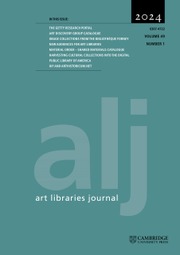Article contents
A reflexive lens: Critical librarianship at UAL
Published online by Cambridge University Press: 15 April 2019
Abstract
This article presents an insider view of engagement with critical librarianship in a higher education and arts library context. The gains from this engagement include a stronger voice in institutional dialogue and collaboration, and the development of exploratory practices in collection development and information literacy that are increasingly informed by critical perspectives.
Our experiences and examples of emerging practise highlight some of the complexities and ambiguities of critical librarianship, around novelty, compliance, institutionalisation, and the challenge of how we convert these theoretical insights into the power structures at play in libraries and archives into meaningful changes for the benefit of all of our students.
Ultimately the conclusion is that if we recognise these power structures, and the particular role of the library in knowledge production, consumption and validation, we must take critically informed action.
- Type
- Research Article
- Information
- Art Libraries Journal , Volume 44 , Special Issue 2: Critical Art Librarianship , April 2019 , pp. 83 - 91
- Copyright
- © ARLIS, 2019
References
- 3
- Cited by


